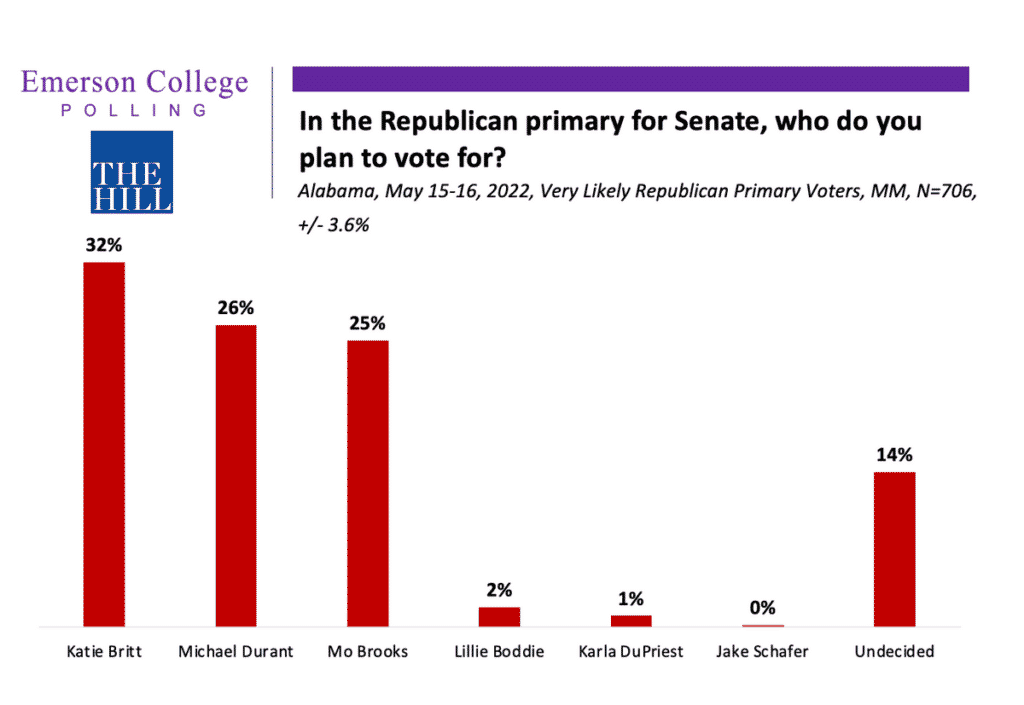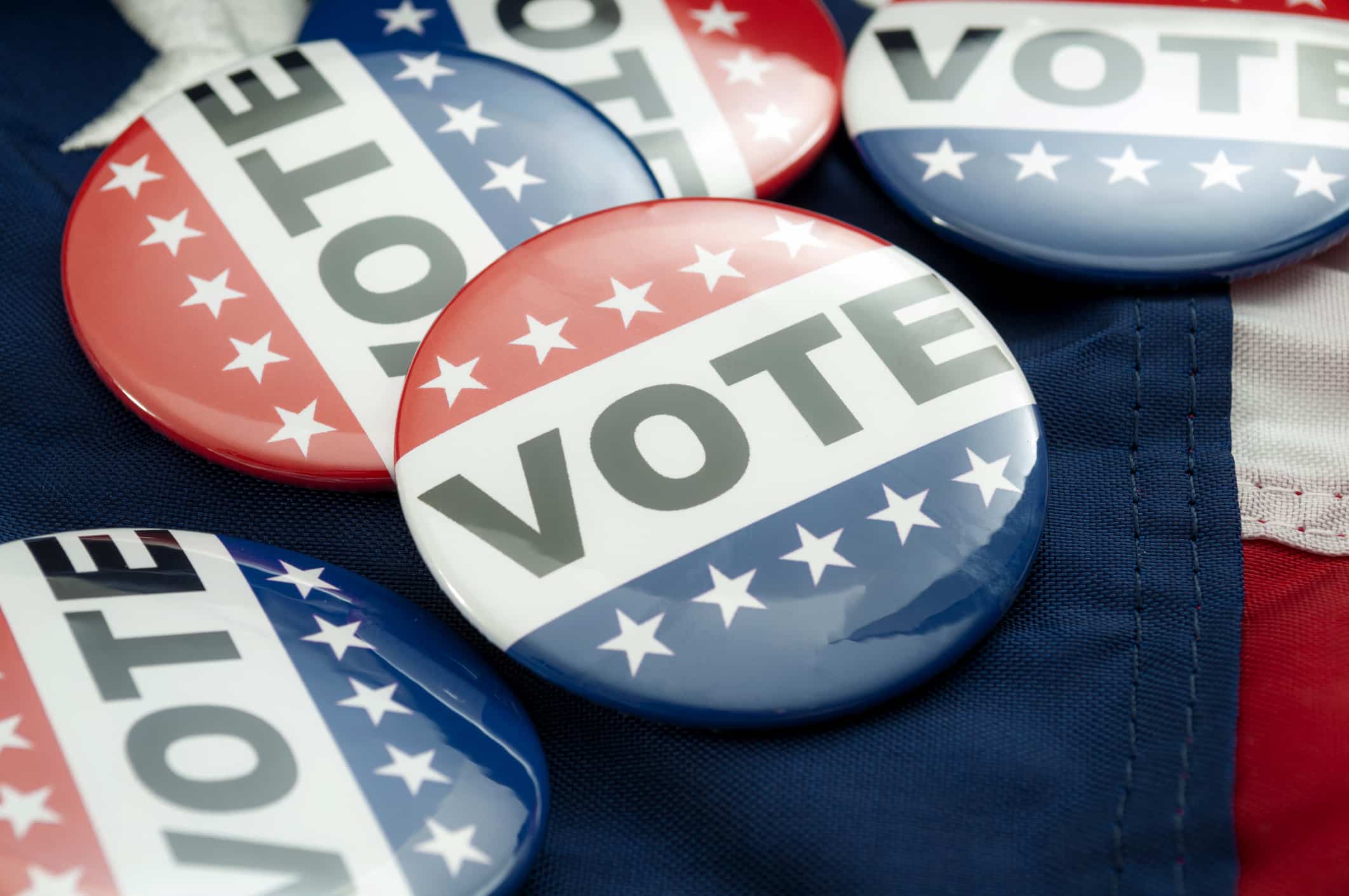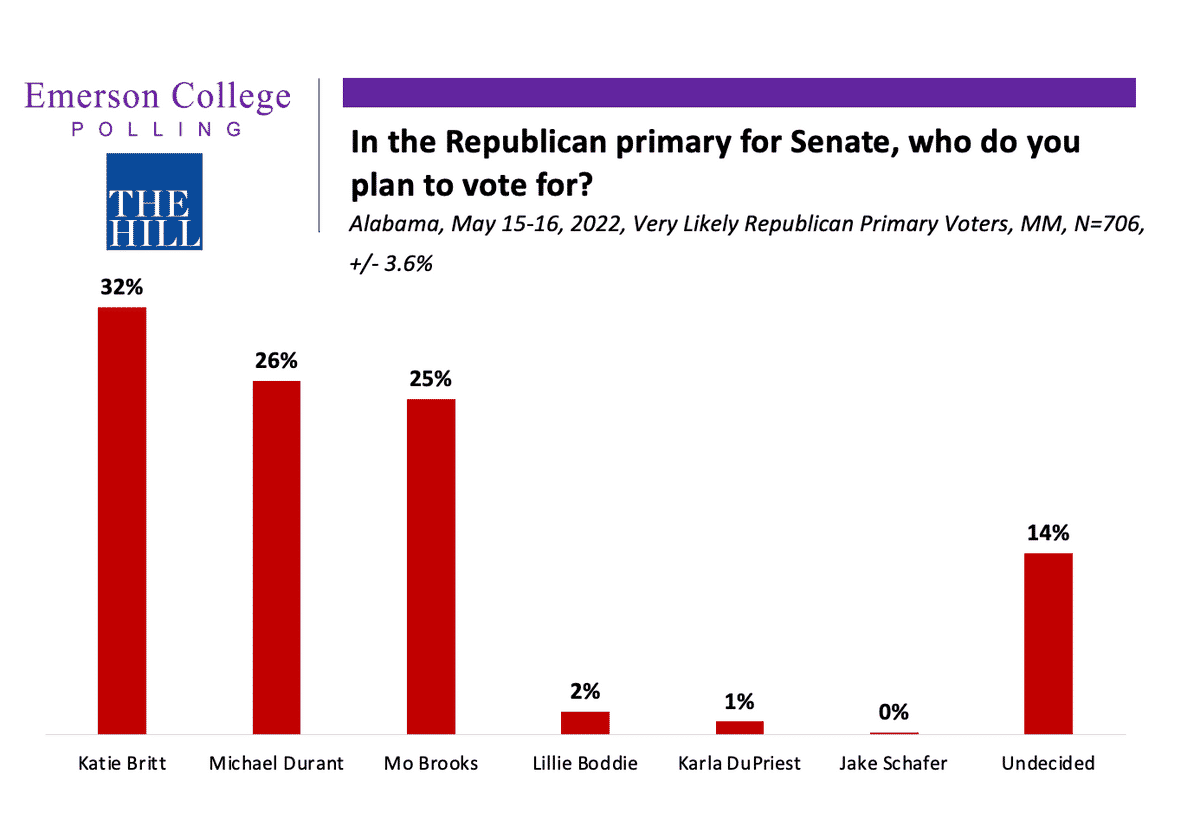Nearly Half of Democratic Primary Voters Undecided in U.S. Senate and Governor Primaries
An Emerson College Polling/The Hill poll of very likely Alabama primary voters finds Katie Britt with a six-point advantage in the Republican primary for U.S. Senate with 32%, followed by Michael Durant at 26%, and Mo Brooks at 25%. Fourteen percent (14%) of voters are undecided. Since the last Emerson College Poll of Alabama voters in March, Britt has gained nine points, Durant has lost seven points and Brooks has gained 13 points. If no candidate reaches majority support like this poll indicates, a run-off election will be scheduled for June 21.

Spencer Kimball, Executive Director of Emerson College Polling said, “Britt holds a plurality of support among those with a college degree or higher with 33%, while 25% of this group support Brooks and 20% support Durant. On the other hand, Durant holds a 34% plurality among those without a college degree, while Britt follows with 28% and Brooks with 24%.”
Governor Kay Ivey holds a 46% approval among very likely primary voters, while 38% disapprove of the job she is doing as governor and 16% are neutral. President Joe Biden has a 64% job disapproval in Alabama, while 33% approve and four percent are neutral.
In the Republican primary for Governor, incumbent Kay Ivey holds a plurality of support at 46%. Ivey’s closest competitors are businessman Tim James with 18% and Lynda Blanchard with 11%. Fifteen percent (15%) of voters are undecided. Ivey’s closest competitors are businessman Tim James with 18% and Lynda Blanchard with 11%. Fifteen percent (15%) of voters are undecided.
“A plurality of undecided voters say they lean towards Ivey when asked a follow-up question of who they lean toward in the gubernatorial primary, allowing Ivey to reach a majority to potentially avoid a run-off this June,” Kimball noted.
A majority, 53%, of Republican primary voters say an endorsement by former President Donald Trump would make them more likely to vote for a candidate, while 30% say it makes no difference and 16% say it makes them less likely to vote for a candidate.
Kimball said, “Among the 53% of voters who say a Trump endorsement would make them more likely to vote for a candidate, 32% support Durant, 28% support Britt, and 27% Brooks. Of the 16% of voters who are less likely to support a Trump-endorsed candidate, 37% plan to vote for Britt, 16% for Durant and 11% for Brooks.”
In the Republican primary for Secretary of State, a majority, 60%, of voters are still undecided, while 20% plan to support Jim Zeigler and 14% plan to support Wes Allen.
In the Democratic primary for U.S. Senate, 49% are undecided while 26% plan to vote for Will Boyd, 15% plan to support Brandaun Dean, and 11% plan to vote for Lanny Jackson. Similarly, in the Democratic primary for Governor, 49% are undecided, while 29% plan to support Yolanda Flowers.
Alabama primary voters are split on Roe v. Wade: 47% think the Supreme Court should overturn Roe v. Wade while 41% think the Supreme Court should uphold it. Twelve percent (12%) are unsure.
When asked which of the following statements comes closest to their position on abortion: legal in all cases, legal up to 20 weeks of pregnancy, legal up to 6 weeks of pregnancy, legal only in cases of rape, incest, and when the woman’s life is endangered, or illegal in all cases, a plurality, 46%, said it should be legal only in cases of rape, incest, and when the woman’s life is endangered. Nineteen percent (19%) say it should be legal in all cases, 14% say it should be illegal in all cases, 12% say it should be legal up to 20 weeks of pregnancy, and 9% think it should be legal up to 6 weeks of pregnancy.
A plurality, 48%, of voters say the Alabama legislature should make abortion harder to access, 28% say they should make it easier to access, and 24% say they should not pass abortion laws.
Caller ID
The Emerson College/The Hill Alabama poll was conducted May 15-16, 2022. The May 24, 2022 primary election sample consisted of early voters and very likely voters in Alabama, n=1,000 with a Credibility Interval (CI) similar to a poll’s margin of error (MOE) of +/- 3 percentage points. The Republican primary sample consisted of n=706, with a Credibility Interval (CI) similar to a poll’s margin of error (MOE) of +/- 3.6 percentage points. The Democratic primary sample consisted of likely voters, n=294, with a Credibility Interval (CI) similar to a poll’s margin of error (MOE) of +/- 5.7 percentage points. The data sets were weighed by gender, age, education, race, and region based on a 2022 turnout model. It is important to remember that subsets based on gender, age, party breakdown, ethnicity, and region carry with them higher margins of error, as the sample size is reduced. Data was collected using a cellphone sample of SMS-to-web and an Interactive Voice Response (IVR) system of landlines.





